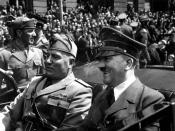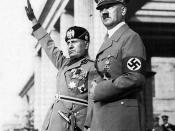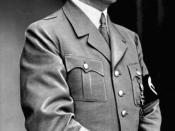Albert Speer had a significant impact, both historically and culturally, on German history from 1918 to 1945. However, few remember him for his Neo-Classical architecture but rather for his association with the Nazi party in general and Adolf Hitler in particular. Mention the name Albert Speer and visions of concentration camps and swastikas come to mind.
Albert Speer was born on March 19, 1905, to an upper middle class family in Manhein, Germany. The second of three sons, he followed the family tradition when, in 1925, he enrolled at the Institute of Technology in Berlin-Charlottenburg and became a third-generation Neo-Classical architect. He was greatly influenced by his professor at that time, Heinrich Tessenow, and upon graduation, two years later, became his assistant. Speer later remarked that the educational system existing at that time emphasised uncritical acceptance of authority and formed the basis for an easily manipulated society.
After reading Spengler's 'Decline of the West', Speer became greatly discouraged, convinced that Germany was in a similar state of decay to that of the late Roman Empire.
Then, in 1931, he heard Adolf Hitler addressing college students at a beer hall. Although initially sceptical of Hitler's reputation and his rough followers, the enthusiasm of the crowd, Hitler's respectable and calm appearance and the historical lecture he delivered impressed Speer immensely. Within weeks, he had joined the National Socialist German Workers Party (NSDAP) and shortly after became a member of the Schutz Staffeinel (SS).
Although an intelligent man, Speer appears to have been politically naive, always maintaining that he joined Hitler's party, as distinct from the Nazi party. He believed that he had to make the choice between a Nazi and a communist Germany and that Hitler only intended to reduce the number of Jews in key occupations to a level consistent with...


